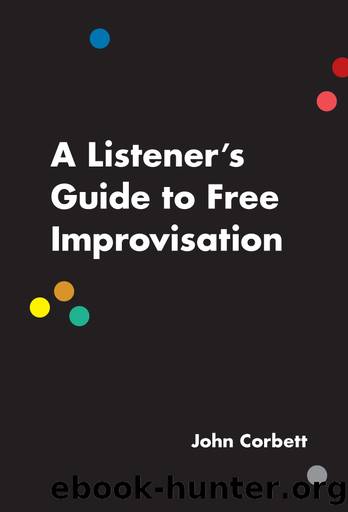A Listener's Guide to Free Improvisation by John Corbett

Author:John Corbett [Corbett, John]
Language: eng
Format: epub
Tags: music, General, Genres & Styles, jazz
ISBN: 9780226347462
Google: foTPCwAAQBAJ
Publisher: University of Chicago Press
Published: 2016-03-13T00:27:34.222551+00:00
Transitions: Observing How the Music Changes
I once engineered a studio recording for three string players, cellist Fred Lonberg-Holm and bassists Kent Kessler and Peter Kowald. Kowald, the elder statesman of the threesome, proposed a particular strategy for some of the pieces: they should do a suite of short improvisations based on the idea that as soon as the music felt like it was about to change, rather than following the impulse, they would stop. Hearing them do this was incredibly instructive for me as a listener. It made me acutely aware of the transition points in the music, places where something that had developed and stabilized would be left behind and something different would take over.
In physics, they call these phase transitions. Like when a substance goes from solid to liquid or from liquid to gas. Itâs about moving from one steady state to another. Sometimes in improvised music thereâs enough disparate stuff going on that itâs hard to hear the steady states. The constant change gives it a perpetual feeling, like when Fibber McGee opens the closet and unleashes an endless clattering of junk. When the music refuses to settle in, it can introduce a pleasant kind of vertigo that makes my stomach flutter.
The contemporary classical composer Karlheinz Stockhausen had a name for this sensibility, a sort of idealized eternal present: moment form. According to this approach, a given musical event should feel neither like it came out of anything before it nor should it suggest a direction that itâs headed. It should just be what it is: discrete, a moment, an intensity, crystallized and then let go, followed by another unique moment, apprehended and released. No chain of events. No development. No past. No future.
Listening to moment-form improvising is like surfing. You have to get on the wave and ride, let the tidal motion carry you forward, but be prepared for the froth of change when the wave breaks. But not many improvisations manage to hold on to moment form. That, in part, is because peopleâs memories intervene, keeping the immediate past suspended in their minds as current events gush ever onward. Again, as one discovers in many circumstances listening to the music, free improvisation has something in common with meditation. Thoughts come into view, are perceived, and the attempt is made to let go of them. But itâs only the true masters who can go thoughtless, making their minds into blank slates on to which the present is projected, outside of timeâs bow and arrow.
When the surf is low and Om is scarce, improvisations tend to move in sequence through steady states, each one being invented and explored on the spot and, once exhausted, abandoned for the next plateau. As a listener, it can be edifying to look for those transition points, identifying the places where one kind of sound-making gives way to another. Try to find the exact temperature at which the ice melts or the water evaporates. This is a little more advanced, but itâs still elemental.
Download
This site does not store any files on its server. We only index and link to content provided by other sites. Please contact the content providers to delete copyright contents if any and email us, we'll remove relevant links or contents immediately.
Kathy Andrews Collection by Kathy Andrews(11793)
The remains of the day by Kazuo Ishiguro(8944)
Spare by Prince Harry The Duke of Sussex(5164)
Paper Towns by Green John(5160)
The Body: A Guide for Occupants by Bill Bryson(5063)
Industrial Automation from Scratch: A hands-on guide to using sensors, actuators, PLCs, HMIs, and SCADA to automate industrial processes by Olushola Akande(5038)
Machine Learning at Scale with H2O by Gregory Keys | David Whiting(4279)
Be in a Treehouse by Pete Nelson(4016)
Never by Ken Follett(3913)
Harry Potter and the Goblet Of Fire by J.K. Rowling(3830)
Goodbye Paradise(3788)
The Remains of the Day by Kazuo Ishiguro(3376)
Into Thin Air by Jon Krakauer(3368)
Fairy Tale by Stephen King(3347)
The Cellar by Natasha Preston(3314)
The Genius of Japanese Carpentry by Azby Brown(3277)
120 Days of Sodom by Marquis de Sade(3244)
Drawing Shortcuts: Developing Quick Drawing Skills Using Today's Technology by Leggitt Jim(3056)
The Man Who Died Twice by Richard Osman(3053)
